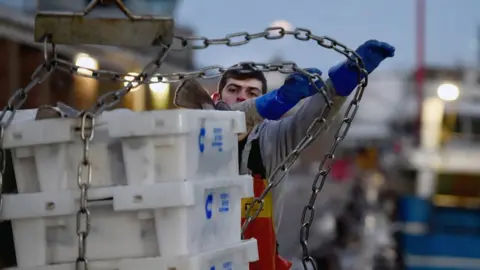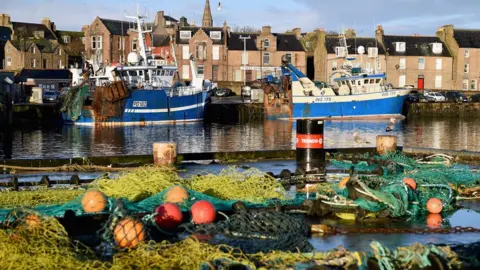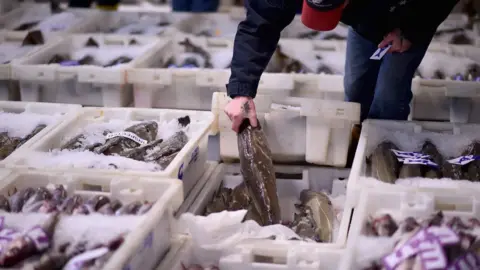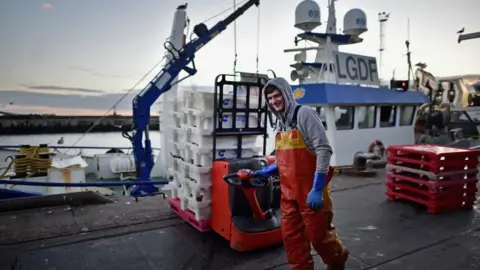Reality bites for the fishing industry

 Jeff J Mitchell
Jeff J Mitchell- Catch quotas have dismayed those with the loudest voices in the fishing industry, but some quotas are up.
- The coming year will see several negotiations decide the future of fishing post-Brexit.
- While expectations have been very high of removing foreign boats from British waters, other EU members are determined to maintain access to UK waters.
- If they don't get what they want, they could limit access to EU markets.
Cod move in mysterious ways. Climate change seems to be encouraging them northwards.
Similarly mysterious are the fishing negotiations that have led to cod quotas in the North Sea being cut by half, to help preserve stocks.
The white fish fleet, dominated by those from north-east Scottish ports, is understandably unhappy. They say the stocks problem is in the southern North Sea.
But let's not forget that others have reason for cheer. The "pelagics" - the bigger boats which you'll see in Shetland, and which go after mackerel - have had a big lift in their quota. Their tonnage and value far outweighs the more familiar white fish served in batter with chips.
 Getty Images
Getty ImagesThis has become part of the pre-Christmas ritual. Fisheries ministers meet in Brussels, talk for two days, and reach a conclusion well into the early hours.
They then emerge, bleary-eyed and talking a baffling language featuring words intended to obfuscate, such as "measures" and "effort". And in sort of pre-Christmas miracle, all of them claim to have won concessions.
For Britain, that's almost certain to change. And the dismay at the loss of catch quota for the white fish fleet is allied to expectations that Brexit will make things much better.
So, will it?
Let's start with 2020. Although the UK is due to leave the European Union on 31 January, the deal struck this week in Brussels will apply to the subsequent 11 months as well. That's while Britain is in the transition stage.
Assuming - as the prime minister, would like us to do - that the transition ends on 31 December 2020, the big change will come when the 2021 fishing quotas are set, a year from now.
What happens after Brexit?
If there were to be a "no deal" departure, the UK government has already set out plans for a big step up in aerial and naval policing of UK waters, to keep European boats out.
UK boats would not have easy access to EU ports. During autumn, the UK government also set out the complex arrangements and paperwork that would be required for exports of fish and shellfish from Britain.
But if it's more amicable, several deals will have to be struck. One will be the over-arching deal on the future relationship between the UK and EU. Others would follow from that, with annual talks on access to UK waters and on quota, not only with the remaining EU members but with Norway, Iceland and the Faroes.
 Getty Images
Getty ImagesThese "independent coastal states" fix annual deals on shared stocks with the European Union. It was such a deal with Norway last Friday that made the 50% cod quota cut inevitable.
Under the EU's much-criticised Common Fisheries Policy, boats from other EU nations are able to catch in UK waters. They have "historic" fishing rights, which are entrenched and rolled over each year. And they've bought quota from UK skippers.
So more than 60% of the tonnage caught from UK waters is caught by foreign boats. The expectation is that that's going to change, a lot.
But there are problems with that:
- Does the British fleet have the capacity to pick up on that potential, and how fast could it grow?
- Does it have a market for the species caught by these foreign boats? Brits are quite fussy about their fish, and don't value the species that are taken to markets in France and Spain.
- And more importantly, will the rest of the EU accept a unilateral ejection from UK waters, even a phased one? And at what price?
That's where the main negotiation with the EU comes in, because fishing rights will be in the mix with all sorts of other issues to be discussed.
An industry with political clout
Fishing is important to coastal communities, but a very small part of the UK economy - around 0.05%. Nevertheless, they are seen as politically potent. The support of fishermen for Brexit was an important part of both the Brexit referendum campaign and the recent Conservative election campaign, where the party held seats in north-east Scotland.
It's the same on the other side of the North Sea, and in France and Spain. Fishing communities have political clout in these countries as well.
In national capitals and in Brussels, notice has been served that they expect continued access to UK waters in any deal about trade.
The new European Commission president, Ursula von der Leyen, gave special mention to fisheries, alongside transport and education, when she said at a summit on Friday that the UK-EU post-Brexit deal has to be about a lot more than trade.
The EU27's leverage is through having the big market. They can say that access to EU markets, for processed fish or anything else, will be dependent on access for EU boats to UK waters.
The question of access
 Getty Images
Getty ImagesHow much access? Well, that's down to negotiation. And alongside fish will be the demands of manufacturers, the finance sector, and everyone else with different priorities and with greater economic and political clout than fishing.
The more realistic participants in this debate concede that there won't be a simple ejection, but maybe a reduction in EU27 quota over several years.
The Scottish Fishermen's Federation argues that there is no precedent for linking access to waters with access to markets.
True. But there's no precedent for Brexit either.
And there are other British interests at play, which are at odds with those who want bigger catch quotas.
- Fish processing firms employed more than 14,000 people in Britain in 2014, with turnover of £4.2bn.
- That is a large part of the £1.3bn of "fish and related products" exports from the UK to the rest of the EU in 2017. For them, market access clearly trumps fishing waters access.
- The inshore fishing fleet is much less affected by the CFP, and unhappy at the loud voices of the Brexit enthusiasts in the bigger boats. Their concern is with maintaining access to EU markets, especially.
- The creel fishing sector sell high value langoustines, lobster and crabs into French and Spanish markets, some of them live and requiring rapid crossings of the English Channel. They can't afford customs delays and don't want tariffs either.
- Salmon farmers are very keen to avoid market constraints and tariffs. Norway, at present, faces a 2% tariff on unprocessed salmon entering the EU, and processed salmon can carry a tariff of up to 12%. Being inside the EU is one reason Norwegian companies have invested in Scottish salmon.
If it's not complicated enough for you, now consider the internal affairs of the UK. We could see UK/Northern Irish fishing boats landing catch from UK waters in Northern Irish ports which, under Boris Johnson's Brexit deal, would avoid any future tariffs because they would be in an all-Ireland market.
That would put them at a competitive advantage over boats from other parts of the UK. So should there be a special Northern Irish quota, to counteract that market distortion?
Unrealistic expectations
And fishing is largely devolved. So when the CFP no longer applies, Holyrood, as well as Cardiff Bay, will be demanding Scottish and Welsh control over fishing waters.
Most of the UK fishing industry operates out of Scottish ports. But will that count for much? As things stand. Whitehall will listen to Scottish lobbying, but will have the final say.
There have been a lot of unrealistic expectations over Brexit - "fish pie in the sky," as Scottish fisheries minister Fergus Ewing described them on Radio Scotland.
Many seem to assume that politics and Brussels is what has been wrong with the industry, and forget that it also has a lot to do with over-fishing and the continuing problem of vulnerable fish stocks.
As reality bites, this is going to be one of the most difficult issues to be faced in the year ahead.
